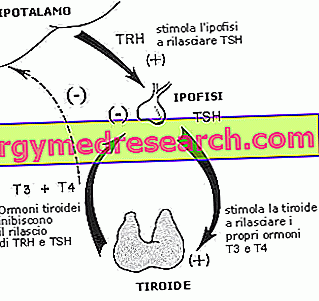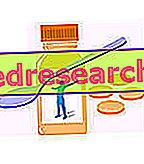Generality
TSH is a hormone that directly affects thyroid activity .
With its presence, TSH promotes the absorption of iodine and the release of the hormones triiodothyronine (T3) and thyroxine (T4) in the bloodstream.

Thyrotropin secretion is instead inhibited by circulating thyroid hormones : when the latter are present in the blood in adequate quantities, the pituitary slows down the production of TSH.
For this reason, the determination of the thyroid-stimulating hormone is the first useful test to assess the functionality of the thyroid, not only when problems are suspected, but also for a routine check of the health of the gland itself.
What's this
Biological role and functions in the body
The thyroid stimulating hormone - better known as TSH - is a peptide hormone secreted by the thyrotropic cells of the anterior pituitary gland.
TSH (Thyroid Stimulating Hormone) secretion is controlled by the hypothalamic hormone TRH (Thyrotropin Releasing Hormone) and the plasma level of thyroid hormones, exactly as shown in the figure; it is therefore subject to a double control: on the one hand it is stimulated by the hypothalamic factor TRH and on the other hand it is inhibited by those thyroid hormones that TSH itself has contributed to produce. Conversely, the decrease in the latter causes an increase in TSH, which in turn stimulates thyroid secretion.

Even a sharp drop in ambient temperature causes the hypothalamus to increase the secretion of TRH, with an increase in plasma TSH levels (thyroid hormones accelerate the metabolism, therefore the production of heat). If necessary, the hypothalamus can also slow the secretion of TSH through somatostatin.
The thyroid stimulating hormone acts at the level of the thyroid, stimulating growth and endocrine activity (biosynthesis and hormonal secretion). The hormones produced by this gland, both containing iodine, are called triiodothyronine (T3) and thyroxine (T4), which alone covers 90% of the secretion.
TSH and Basedow's Disease
Like all peptide hormones, TSH carries out its biological action by interacting with specific membrane receptors ; in a particular disease, known as Basedow's disease, abnormal antibodies bind to these receptors mimicking the biological action of TSH. The result is an excessive stimulation of the thyroid activity, with a clinical syndrome sustained by the excess of T3 and T4 (thyrotoxicosis), often accompanied by goiter, that is to an increase - in this case widespread and uniform - of the thyroid gland. According to the above, in patients with Graves' disease TSH levels are extremely low, not to mention absent (since thyrotropin secretion is inhibited by the excess of thyroid hormones). As a result, in this and in all other thyroid diseases, to obtain valuable information on its activity, it is necessary to evaluate the plasma levels of both TSH, T4 and sometimes T3.
Why do you measure
As mentioned, TSH is a hormone that regulates the production and secretion of thyroid hormones. Therefore, the measurement of TSH is used to verify and assess whether the thyroid works correctly, through the identification of possible alterations of hormonal secretion.
When it is necessary to ascertain the functionality of the thyroid, reference is made to the hormones TSH, T3 and T4, which are included in the blood analysis panel of the case.
- If there is a low value of TSH, compared to high levels of T3 and T4, it is very likely that there is a clinical picture of hyperthyroidism, thus excessive thyroid activity.
- We speak of hypothyroidism, instead, when the thyroid stimulating hormone is high and T3 and T4 are low.
Furthermore, detecting TSH values allows monitoring whether the therapy used to treat hypothyroidism or hyperthyroidism works or not.
An alteration in the levels of the thyroid hormone indicates an excess or deficiency in the concentration of available thyroid hormones, but does not indicate the reason. To understand the cause, the finding of an abnormal TSH concentration usually leads to other tests.
When is the exam prescribed?
The TSH determination is indicated by the doctor for:
- Screening and supporting the diagnosis of thyroid diseases, in the presence of characteristic symptoms and / or an enlargement of the thyroid gland;
- Monitor the effectiveness of the therapeutic protocol in case of hypothyroidism or hyperthyroidism. For hypothyroidism, there is a replacement therapy with thyroid hormones; for hyperthyroidism, there is a suppressive treatment of thyroid activity.
Normal values
In healthy adult subjects the blood TSH ranges from 0.4 to 4 µU / ml (with reference intervals varying from laboratory to laboratory also in relation to the characteristics of the patient).
TSH High - Causes
- Primitive hypothyroidism (if the thyroid does not synthesize adequate amounts of its hormones, the pituitary and the hypothalamus try to stimulate it by increasing the synthesis of TSH):
- Congenital hypothyroidism (cretinism);
- Acquired hypothyroidism (eg due to iodine deficiency, thyroid surgical removal, chronic effects of radioactive iodine treatment).
- Peripheral and / or pituitary resistance to the action of thyroid hormones.
- Hashimoto's thyroiditis.
- Administration of antithyroid drugs (thionamides - methimazole, propylthiouracil).
- "Autonomous" pituitary hypersecretion: TSH secreting adenomas.
- Insufficient intake of thyroid hormones (eg eutirox) in the treatment of hypothyroidism.
- Production of ectopic paraneoplasty of TSH-like substances (for example in the presence of malignant tumors at various sites: lungs, gastrointestinal tract, breast, uterus, prostate, etc.).
TSH Low - Causes
- Primitive hyperthyroidism:
- Graves' disease;
- Single or multiple hot nodules;
- Multinodular toxic goiter.
- Secondary or tertiary hypothyroidism, respectively linked to the inability of the pituitary gland to secrete TSH, the first, and of the hypothalamus to secrete TRH, the second; to distinguish the two forms the TSH values are measured after injection of TRH: if they increase the problem is at the hypothalamic level (eg hypothalamic tumors), while if they remain low the problem is at the pituitary level (eg pituitary adenomas).
- First trimester of pregnancy.
- Excessive intake of thyroid hormones (eg eutirox) in the treatment of hypothyroidism.
How to measure it
The TSH test is performed on a blood sample taken from a vein in the arm.
Preparation
Several drugs can decrease or increase TSH levels (aspirin, interferon, glucocorticoids, dopamin antagonists, somatostatin and bexarotene). For this reason, before performing the analysis of blood TSH it is important to inform your doctor about any ongoing drug therapies.
Results can also be influenced by:
- Increase, decrease and changes (inherited or acquired) in proteins that bind T4 and T3;
- Pregnancy;
- Liver disease;
- Strong stress and acute systemic diseases.
Interpretation of Results
- Thyrotropin values higher than the reference ones often indicate a situation of hypothyroidism (slowing down the thyroid activity). In most cases, this condition is due to a damaged thyroid or an attack on the gland by the immune system. High TSH can also be associated with thyroid cancers, which produce the hormone in an irregular way.
- Lower levels of thyrotropin may indicate, instead, the presence of hyperthyroidism (excessive activity of the thyroid) or poor functioning of the pituitary gland.
TSH | T4 | T3 | Interpretation |
High | Normal | Normal | Moderate hypothyroidism (subclinical) |
High | Bass | Normal low | Obvious hypothyroidism |
Norma. | Normal | Normal | Euthyroidism (healthy patient) |
Bass | Normal | Normal | Moderate hyperthyroidism (subclinical) |
Bass | High normal | High normal | Manifested hyperirodism |
Bass | Normal low | Normal low | Rare hypothyroidism pituitary (secondary) |



